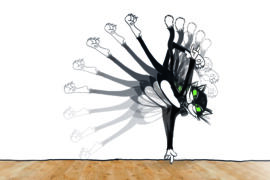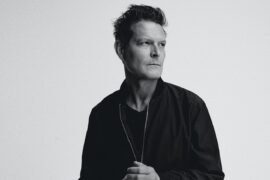Herbert Grönemeyer (66) holds the world up to a mirror in his new album “Das ist los” and tries to spread optimism despite all the calamities.
What reaction do you think is indicated?
I believe that time is running out and a lot of people need to wake up. We have languished very well in our comfort for a long time, but now the situation is so alarming that we have to realise that in many ways we can no longer continue in this way. So it is only legitimate to make demands and want changes.
What gives you reason to be optimistic?
If there is something positive to be taken from all the crises in recent years, it is that they have increased our awareness and made us so sensitive that certain things touch us more than before. It’s no longer so easy for us to quickly push things to the back of our mind
What are you thinking about?
The situation in Iran, which is actually far away and yet very present. Now that we have the images from the Ukraine conflict in front of our eyes every day, we can also imagine much more vividly how cruel the civil war in Syria was.
Hasn’t the climate crisis been somewhat forgotten due to the Ukraine war and the shortage of raw materials?
No, oddly enough it hasn’t, although there is a reflex that you can’t deal with everything all the time. It’s true that you need a break from time to time. However, the pandemic and inflation have made some things more visible, such as the fact that 13 million people in Germany are affected by poverty, i.e. one in six. For this reason, I founded a group with some friends with the intention of dealing with this topic.

How did the title song «Das ist los» come about?
My Welsh producer Alex Silva still speaks German relatively poorly, despite the fact that he has lived in Berlin for twenty years. That’s because he’s very charming and that’s why most people talk to him in English. When I call him and ask what’s going on with him, he always says, «Das ist, was ist los.» A translation of the phrase «That’s what’s happening.» He recorded
it himself, sings along too and contributed this guitar sound. From this we recorded this song in a studio in Sweden, in which we rattled off names and keywords at a rapid pace.
Do you want to add some lightness to the album with this number reminiscent of «Da Da Da»?
That’s right, the song is reminiscent of Trio and is musically a mixture of New German Wave and rock ‘n’ roll as well as a pastiche of the whole information frenzy. Like «Männer», where I am still seriously asked whether this song was about male psychology, «Das ist los» is above all a fun thing.
What does the dancing that appears in several songs mean to you?
For me it’s a way to forget. If you dance for an hour or two – or longer if you’re up to it – you have the chance to clear your head even at times like these. And since, as everyone knows, I’m also a great dancer on stage, I like to sing about it. Sometimes the word sneaks into the lyrics almost unnoticed, as in «Baby, you wanna dance» in «Herzhaft». I’ve already sung the line in the English version of «Bananen-Texte» and couldn’t find a suitable translation. It always sounded square.

Have you ever had any inhibitions when dancing?
No, never! When I was a teenager I often went to France and also played in bars there. Then the French taught me their rock ‘n’ roll, which they danced two-handedly and with incredible twists, spins and throws. When I demonstrated it at parties in Germany, I impressed people enormously. At the beginning of the 1970s, people not only went to a party every Saturday, but also stopped by at least two or three parties. Later – much to the chagrin of my bodyguards – for a while I went to techno parties after the concerts and danced to lower my adrenaline level.
Your dance moves on stage sometimes attract smiles …
Satirists Wiglaf Droste and Bela B. from Die Ärzte even made fun of me in a song: «Grönemeyer kann nicht tanzen». They had been at a concert in the 1980s, wondered who this guy was who danced so strangely and thought I was going to be really upset about the song, but I thought it was funny. People from the Ruhr area know no shame in this regard, since we are not considered to be very German in general and especially because of our funny language!
You never had a theme with your singing style, did you?
No, I’m completely uninhibited in this respect too, because it’s my personal expression. It always got on my nerves when producers wanted to tinker with my way of singing, even though I told them my role model was Bob Dylan, they didn’t understand a word of it. I said to myself: I sing like I sing and I kiss like I kiss. There are no judges either.
«Genie» is an invitation to dream big. Have you always done this or only due to a certain experience?
I felt early on that you have to be part of the action. I got recognition, for example, when I sang a song at my mother’s coffee morning and played my ukulele.
You sing about women not only as lovers, but also as heroines and rescuers. Are they the greatest hope left to mankind?
Their courage and energy are much needed at the moment, because the fight for equality and equal rights is far from over. With their female intelligence and way of thinking, but also their radicalism and militancy, which you can see in Iran right now, where the women are making an impression with their incredible courage and bravery despite death threats, they could succeed in getting the crises of this world under control.

How did the rather unusual love songs on this record come about?
The line «Manchmal left der Tau sich auf mich» in «Tau» describes the melancholy when you feel uneasy about being so happy because this feeling is almost too beautiful to last. «Tonne Blei» is about a selfish and obsessive relationship. «Urverlust» puts into words the pain you feel when, looking back, you realise that you made mistakes in the past that caused your life to take the wrong direction.
At 66, do you often take time out between record productions and tours, for example to holiday at your apartment in Celerina?
No, I could think about taking things a little easier, but I’m very restless and always creating new tasks for myself because otherwise I’m afraid I’ll stand still. In addition to theatre and music, I used to do sports. I still enjoy that, but then I had such a cough in Celerina that I just couldn’t make a sound.
Before a tour, you probably shouldn’t have been allowed to ski anyway for insurance reasons …
Exactly, because of this and because it is good fitness training, I actually wanted to do cross-country skiing. However, because of the cold I had I could only go for walks and enjoy the fresh air.
Fotocredits: Victor Pattyn





